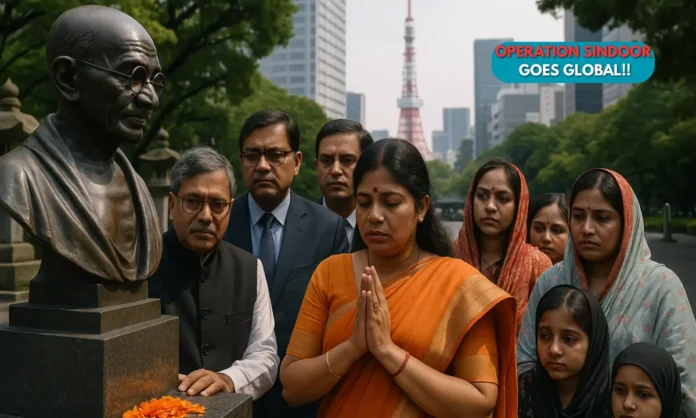Summary
- A multi-party Indian parliamentary delegation led by JDU MP Sanjay Jha began its diplomatic tour in Japan under the banner of Operation Sindoor.
- Japan’s Foreign Minister publicly declared support for India’s stance against terrorism, amid shared concerns over regional security.
- Delegates explained the emotional and strategic roots of Operation Sindoor, emphasizing India’s evolving global counterterrorism narrative.
From Pahalgam to Tokyo: A New Chapter in India’s Counterterror Diplomacy
In the heart of Tokyo, a bust of Mahatma Gandhi stood witness to a solemn ceremony marking India’s renewed diplomatic offensive against terrorism. But this wasn’t just symbolism—it was the start of Operation Sindoor’s global leg. Spearheaded by JDU MP Sanjay Jha, a bipartisan parliamentary delegation landed in Japan to take India’s anti-terror message to key international allies. The tour is deeply personal, politically strategic, and diplomatically ambitious.
At the center of this mission is a raw national wound: the Pakistan-backed terror attack in Pahalgam that killed dozens of Indian men, leaving behind grieving women and children. The emotional weight of the tragedy shaped the very name “Operation Sindoor”—a nod to the vermilion worn by married Hindu women, now smeared in sorrow. As BJP MP Aparajita Sarangi explained during a think tank interaction, the operation’s symbolism reflects India’s resolve to avenge not just lives lost, but dignity stolen.
What sets this outreach apart is its clarity. Unlike past hedging, India’s message is direct: zero tolerance for terrorism, no room for nuclear blackmail, and no ambiguity in global forums. And in Tokyo, the message landed well. Japan’s Foreign Minister Takeshi Iwaya publicly affirmed solidarity: “In this fight against terrorism, Japan stands with India.”
📍Day 2: Tokyo, Japan 🇯🇵
— Sanjay Kumar Jha (@SanjayJhaBihar) May 23, 2025
Our all-party delegation engaged with the Diplomatic Corps in Tokyo at @IndianEmbTokyo—strongly reaffirming India’s zero-tolerance policy towards terrorism.
India’s message to the world is firm—terrorism anywhere is a threat to peace everywhere.… pic.twitter.com/iByszekzNk
Operation Sindoor Explained: Grief, Resolve, and the Power of Symbolism
- The name “Sindoor” was chosen to honor the widows created by the Pahalgam terror attack.
- The operation’s logo—a scattering box of vermilion—reflects the symbolic and emotional impact of the massacre.
- Delegates included MPs from across party lines, representing India’s united political front.
- Japan, Malaysia, Indonesia, South Korea, and Singapore are among the countries on the mission’s itinerary.
Operation Sindoor is unlike any recent diplomatic initiative. It’s not just geopolitical—it’s moral. According to BJP MP Sarangi, the campaign name was inspired by the cultural trauma of women widowed by the attack, whose sacred sindoor was wiped away in a single moment. “It is a tribute to the wives and daughters who lost their fathers and husbands,” she told a Japanese audience, “and a promise to never forget.”
India has often struggled to convert its domestic narrative on terrorism into international solidarity. Operation Sindoor changes that. This delegation, which includes Congress veteran Salman Khurshid, TMC’s Abhishek Banerjee, and CPI(M)’s John Brittas, signals rare political unity on a foreign platform.
The itinerary also shows strategic intent: Malaysia and Indonesia (Muslim-majority), South Korea (a U.S. ally), and Singapore (a regional economic hub) are all on the radar. In each, India aims to spotlight its stance on cross-border terrorism, cyber warfare, and information manipulation—particularly by Pakistan—while also reinforcing bilateral ties.
When Tokyo Listens: Global Resonance and Realpolitik
- Japan’s Foreign Minister made a rare public statement supporting India’s anti-terror position.
- Think tanks engaged with India’s narrative on Pahalgam and digital warfare from Pakistan.
- Delegates clarified India’s non-neutral stance on Russia-Ukraine—arguing war is not the solution, not silence.
- Tokyo sees shared stakes with India in countering extremism and protecting maritime security.
The Tokyo stop was more than ceremonial. Behind closed doors, Indian delegates engaged deeply with Japanese officials, government advisors, and think tanks. And for once, the global response wasn’t polite indifference—it was engaged support. Japan, which has long faced threats from North Korea and regional instability, found resonance in India’s directness.
Foreign Minister Takeshi Iwaya didn’t mince words: “Japan stands with India.” It’s a phrase with diplomatic weight, especially at a time when Japan is recalibrating its regional defense posture.
Interestingly, the delegation also addressed foreign concerns about India’s geopolitical position. When a think tank member questioned India’s Russia-Ukraine neutrality, former External Affairs Minister Salman Khurshid corrected the record: “India is not neutral. India’s position is that war is not the answer.” It was a masterclass in diplomatic nuance—assertive, not evasive.
Beyond Borders, Beyond Politics: A Mission with Momentum
Operation Sindoor is proving to be more than symbolic outreach. It’s a coordinated geopolitical strategy. From Japan to Southeast Asia, India is transforming its narrative from victimhood to vigilant power. By combining emotional authenticity with strategic messaging, the delegation has sparked real diplomatic conversations—backed by national unity.
This mission matters not just because of where it’s going, but what it’s carrying: the story of a country that refuses to be silent after its people bleed, and a message that terrorism, no matter how cloaked in politics or propaganda, must be confronted head-on.
As the delegation prepares for its next stops, the global community watches closely. In a polarized world, India is crafting a new model of diplomacy—one rooted in shared pain, national pride, and uncompromising resolve.


